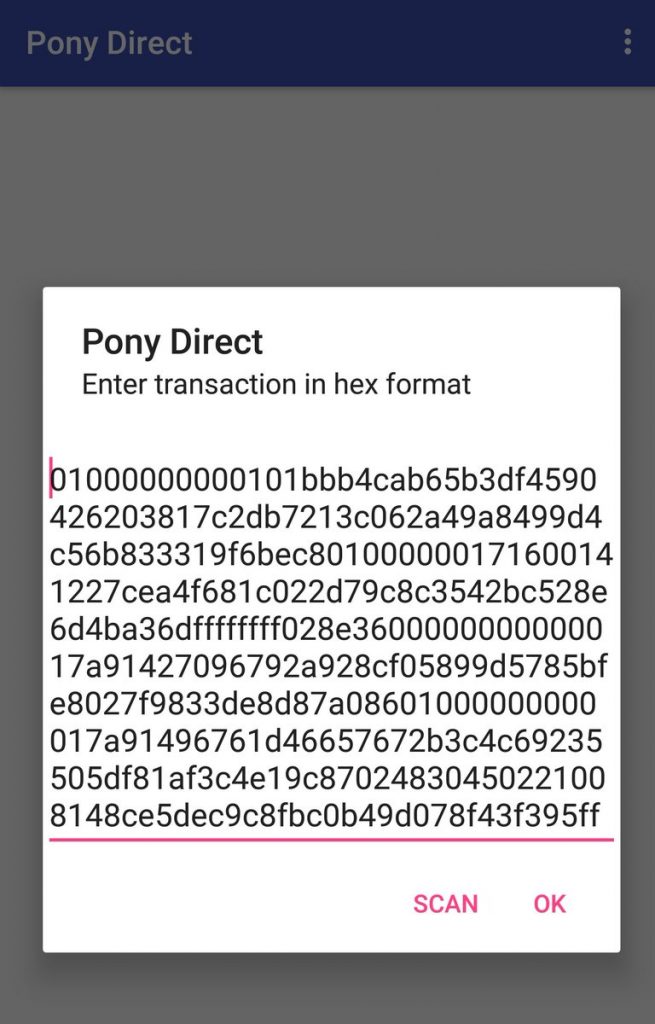
Bitcoin privacy wallet pioneers Samourai Wallet have announced a new proprietary app called Pony Direct, a transaction payment method (or to act as a relay) to send bitcoin via short message service (SMS), popularly used for texting. It’s a creative way to improve upon censorship resistance.
Also read: Ditch University and High Transaction Fees!
Samourai Wallet’s Pony Direct App
T Dev D of Samourai Wallet explained to News.Bitcoin.com: “Pony Direct can be used to forward bitcoin transactions via SMS even when internet connections are blocked or shut down. Simply using the app to send a transaction via SMS to any cooperating and internet-connected Android device will effectively route around any internet censorship being practiced where the sender is located.”
“Pony Direct was developed in-house as a proof-of-concept app with the intention of open sourcing it to be an open invitation for developer participation in the Mule Tools project as a whole,” T Dev D noted. In keeping with their open source ethos, Pony Direct is available on Github.

Internet censorship is a favorite of governments as a way to shut down dissidents, and there’s every reason to believe it would be a first response should cryptocurrencies like bitcoin become a real threat. In 2016, countries like India, Saudi Arabia, Morocco, Iraq, Brazil, Republic of the Congo, Pakistan, Bangladesh, Syria, Turkey, and Algeria, to name just a few, worked hard to shut down social media access especially. SMS might be a way around such scenarios.
News.Bitcoin.com asked how SMS within the Samourai Wallet operates. T Dev D clarified: “The issue is that as SMS can only contain up to 160 characters, a way must be found to send as many SMS as possible to communicate the bitcoin transaction to the party capable of broadcasting it on the network. The first SMS in the sequence contains info on the total number of SMS in the series, the hash ID that must be matched at the end, a batch ID, a sequencing number, and a portion of the actual transaction hex. The following SMS contain a sequencing number, the batch ID, and more transaction hex data. Once the receiving device has accepted the expected number of SMS for a same batch from the same incoming number, the transaction data is extracted from each message and the entire transaction is re-assembled and pushed out to the bitcoin network.”
Pavol Rusnak
Pony Direct is “part of ongoing R&D into alternative broadcasting methods to enhance censorship resistance,” Samourai tweeted. Censorship resistance is a serious goal for the uber-privacy wallet project; its team bills themselves as “privacy activists who have dedicated our lives to creating the software that Silicon Valley will never build, the regulators will never allow, and the VC’s will never invest in. We build the software that Bitcoin deserves.”
When asked about the wallet project’s overall status (it remains in alpha), T Dev D answered, “Samourai is moving ahead with its roadmap and experiencing rapid growth during this period of mass media attention on the crypto-currency space.” Though the wallet is Android-based at the moment, “We plan to have an iOS version of our wallet ready for later this year,” News.Bitcoin.com was told.

SMS transacting as an experiment was published summer of last year by Pavol Rusnak who wanted to use a legacy method to send bitcoin. Smspushtx was his project. He did have to register with an inbound SMS service provider and chose Nexmo because they didn’t charge.
He set up a virtual number which allowed him a webhook, and pointed it at his Flask server, which in turn consumes and forwards messages. The only trouble was limiting messages to 160 characters. The message is then linked together in a chain or series; he used an Insight service API to push the transaction and used both hexadecimal format and base64 format. Readers are encouraged to see the experiment for themselves.
Now there’s a bitcoin wallet that can do all that as well.
What do you look for in a wallet app? Let us know in the comments section below.
Images courtesy of Pixabay, Samourai Wallet.
Not up to date on the news? Listen to This Week in Bitcoin, a podcast updated each Friday.
